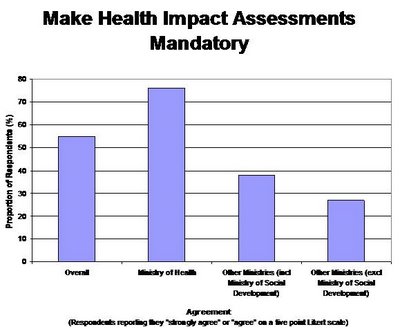Gaulda R, Bloomfield A, Kiro C,Lavis J, Ross S. Conceptions and uses of public health ideas by New Zealand government policymakers: report on a five-agency survey, Public Health 120(4): 283-289. doi:10.1016/j.puhe.2005.10.008
There are a number of interesting findings in the survey but the one that I find most compelling is the attitudes to making HIAs mandatory that are reported:

As you can see, health policy-makers are largely supportive of the ida of making HIAs madatory (76%)but policy-makers from other sectors are less convinced (38%). Support for the concept of HIAs being mandatory is further reduced when respondents from the Ministry of Social Development, probably New Zeland's largest human services ministry, are removed from the "other" catgory (only 27%).
This is quite telling becuase New Zealand has done a moderate amount of work in developing HIA and using it to assess other sectors' proposals (and it's not just government that supports its use).
I suspect that if a similar survey was done in Austalia or other countries where capacity to undetake HIA is being built there may be even less support for the idea of making HIA mandatory.
What do you think about this? I think it suggests that a softly-softly approach to involving policy-makers from non-health sectors in HIA may be more appropriate than a regulatory/mandated one.
Article Abstract
Objectives
This article describes New Zealand government policymakers' awareness of, attitudes toward and self-reported use of ideas about the determinants of health. Some comparison with an earlier Canadian study is provided.
Methods
Employees with policymaking and advisory responsibilities in government departments of health, social development, housing, education and finance were surveyed.
Results
More than half of the respondents (58%) were familiar with ideas about health determinants. Eighty percent felt that health determinants should be considered in all government policy, but that more practical information on effective policy interventions is needed. Commitment to the idea that the economy should take precedence over reducing health inequalities was low.
Conclusions
There is a demand for literature on health determinants that is sector specific and which provides practical and proven information about effective interventions that influence health.


0 comments:
Post a Comment